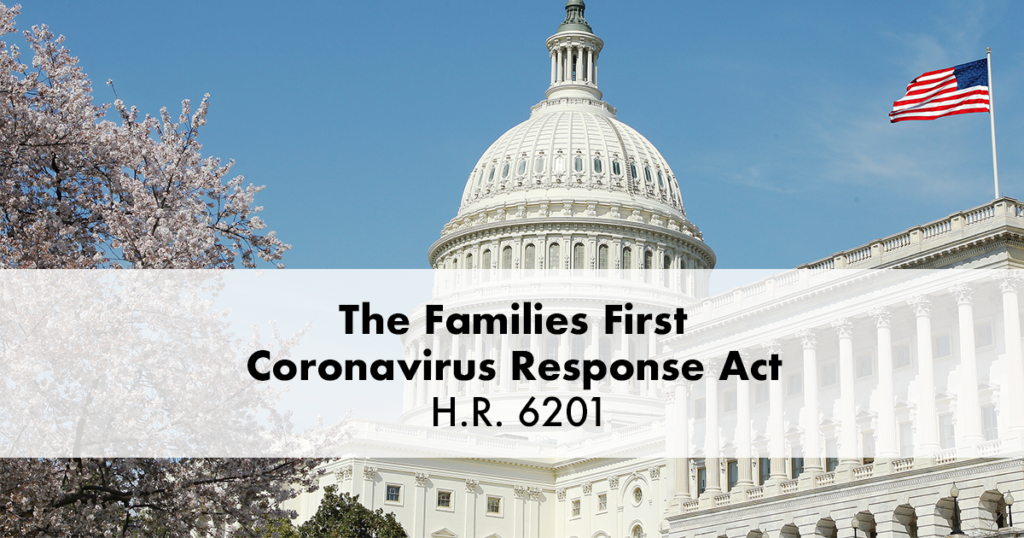
The Family First Coronavirus Response Act, which goes into effect not later than April 2, 2020, includes a pair of paid leave provisions for some employees impacted by COVID-19.
First, the Act enables employees who work for employers with less than 500 employees, and have done so for at least 30 days, to take up to 12 weeks of job protected leave to care for a minor child if: (1) the child’s school or place of care has been closed due to COVID-19 or (2) the child’s care provider is unavailable due to COVID-19. The first two weeks of leave are unpaid, but the employee may use available paid time off or sick leave during this period. The next 10 weeks of leave are to be paid at two-thirds of the employee’s normal pay rate, up to $200 a day or $10,000 in the aggregate. Like existing leave under the Family and Medical Leave Act, the employee must be restored to her position, or a similar one, upon return from leave.
The Secretary of Labor can exempt health care providers and first responders from coverage, as well as businesses with fewer than 50 employees, if the viability of the business would be jeopardized. Employers with fewer than 25 employees do not need to restore a returning employee to her job, if the employee’s position no longer exists because of COVID-19, but the employer must take reasonable steps in attempting to place the employee in a comparable position. An aggrieved employee has the same recourse she would have under the existing FMLA framework, including damages for lost pay, along with liquidated damages in an equal amount and attorney’s fees, in the event she is wrongfully terminated because of her exercise of rights afforded by the Act. Employers who would, but for this Act, be exempt from the FMLA (those with fewer than 50 employees) are not subject to these remedies.
It is important to note that the basic provisions of the FMLA remain intact. That is, covered employees (those who have worked at least 1,250 hours in the previous year for employers with 50 or more employees within a 75 mile radius of the worksite) are entitled to up to 12 weeks of unpaid job protected leave to care for their own serious medical condition or that of a family member.
Second, the Act entitles some employees to up to 80 hours of paid sick leave. Only employees of employers with fewer than 500 employees are covered. Part-time employees of such employers are to be paid based on the number of hours they would ordinarily work during a two-week period. For an employee to be eligible, she must be also be unable to telework. Coverage is triggered if the employee:
1. is subject to a Federal, State, or local quarantine or isolation order related to COVID-19;
2. has been advised by a health care provider to self-quarantine due to concerns related to COVID-19;
3. is experiencing symptoms of COVID-19 and seeking a medical diagnosis;
4. is caring for an individual who is subject to an order to quarantine or self-isolate or has been advised by a health care provider to self-quarantine due to concerns related to COVID-19;
5. is caring for a son or daughter, if the school or place of care of the son or daughter has been closed, or the child care provider of such son or daughter is unavailable, due to COVID-19 precautions; or
6. is experiencing any other substantially similar condition specified by the Secretary of Health and Human Services in consultation with the Secretary of the Treasury and the Secretary of Labor.
If the sick time relates to one of the first three reasons above, the pay is at the employee’s full rate of pay, up to $511 per day or $5,111 total. If the sick time relates to the fourth, fifth, or sixth reason above, the pay is at two-thirds the normal rate (or minimum wage, whichever is greater), up to $200 per day or $2,000 total. As with the expanded FMLA coverage explained above, the Secretary of Labor can exempt health care providers and first responders from coverage, as well as businesses with fewer than 50 employees. Aggrieved employees have the same remedies as they would have for a minimum wage violation under the Fair Labor Standards Act, including liquidated damages and attorney’s fees.

